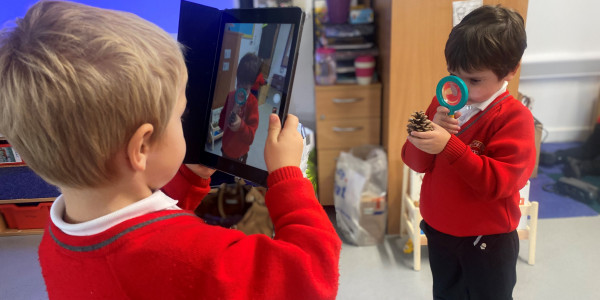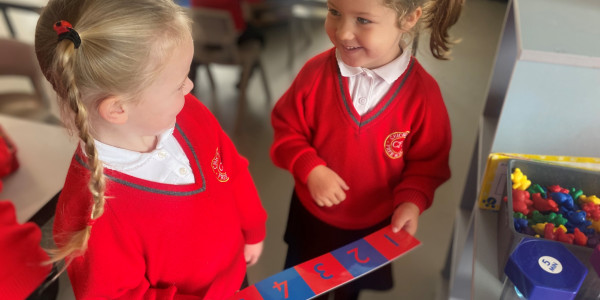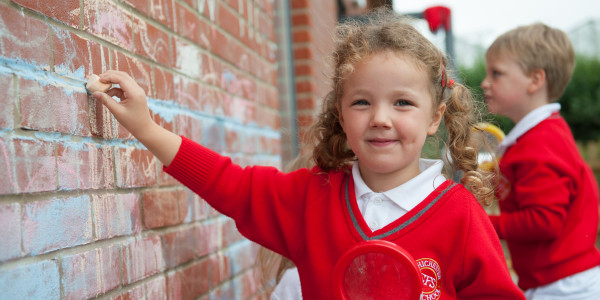


At CFS, teaching and learning across the Primary phase takes place within a topic based curriculum approach with a focus on mastery of fundamental skills in the core subjects of Literacy and Numeracy within a broad and balanced curriculum. This means that wherever possible we group our subjects around a topic, theme or high quality text. During the course of the school year each year group will cover between 4 and 8 topics (learning experiences) that will have a variety of focus, including science, history or geography. Subject specialists from the Secondary phase also teach Primary age children in areas of the curriculum that we feel this is of benefit, this includes physical education, french and music.
Learning Experiences
Learning experiences are enriched with a range of trips and visits that bring the curriculum alive and provide children with real life experiences. This approach also develops their understanding of the community around them and our local area - Chichester, the South Coast, Great Britain and its place in the wider world. In the summer term Year 6 attend a week long residential trip to an outdoor education centre. This provides them with a range of experiences to challenge them in different ways and build confidence and self-esteem as they prepare for transition to our Secondary phase.
Immersing children in learning experiences like ‘Raiders or traders, ‘Location, location, location’, ‘Gruesome Gladiators’ and many more not only provides exciting learning opportunities, but also allows them to be inquisitive and passionate about their learning. Throughout a topic, children work towards an exciting end point in which they can share their learning with parents and friends of the School.
Phonics
At CFS, phonics is taught discreetly from EYFS to Year 2 in class groups using the DfE validated 'Twinkl Phonics' Scheme. Children from Year 3 to Year 6 are taught in specialist teaching groups as required to ensure additional support is provided to children who are not working at age related expectations. This ensures that all children have a strong knowledge and understanding of phonics as a reading and writing strategy throughout the school.
English
Reading is taught through discreet guided reading sessions across Key Stage 1 and whole class reading sessions across Key Stage 2. We have a well stocked library which all pupils access when ready. Our early and developing readers work through the ‘Rising Stars’ reading scheme, which is supplemented with library books, before moving on to access ‘Accelerated Reader’ a programme which guides them through the books in our library, link here.
All teachers plan English units of work around high quality text that link to their current topic. These are often drawn from ‘The Power of Reading’, an approach based on research from the Centre for Literacy in Primary Education. This ensures that pupils are exposed to age appropriate, yet challenging text as a stimulus for the teaching and learning of reading, writing, punctuation and grammar.
The intention of the documents below are to help guide questioning, when listening to your children read at home. Reading comprehension adds meaning to what is read and occurs when words on the page are not just mere words but thoughts and ideas. Comprehension makes reading enjoyable, fun and informative for our children, enabling them to develop a love for reading.
Maths
In the Primary phase, children’s daily Mathematics lessons follow a mastery-based approach, promoting success for all of our learners - we truly believe that all children have the ability to be mathematicians. While some require scaffolding to achieve success, others may require further stretch and challenge to reach their full potential. Although we closely follow the White Rose Education scheme of learning, we use supplementary materials from other high-quality resources to tailor our curriculum delivery to the needs of our children at CFS.
Please find further information about our curriculum vision and intent here:
Children are taught concepts in ‘blocks’ which consist of small steps of learning. These are designed so that children revisit and build on previous learning, allowing children to develop a full understanding of a concept over several years. The Concrete, Pictorial and Abstract approach underpins our curriculum delivery. Children are shown a range of models to help scaffold their learning and make connections with known knowledge and skills.
Please find our long-term overview, skill progression document and CPA calculation document here:
Maths at Home
We acknowledge that recalling key facts quickly and accurately (fluency) is an important factor in developing children's confidence and resilience when faced with more challenging material in Mathematics. When children can automatically recall these facts, they can focus their thinking on more complex ideas, reducing their cognitive load. We have mapped out six key skills for each year group to focus on. Children are assessed at the beginning and end of each half term to track progression. We would be grateful if you could help your child learn these facts at home:
Children from Year 1 to Year 6 have access to Times Tables Rock Stars (TTRS). In Year 3 and 4, it is expected that all children play for at least 30 minutes at home each week to help consolidate their multiplication and division facts.
In Year 5 and 6, children are set a 30-minute homework on Sparx each week, based on what we have been learning in class. This is the same platform which is used in Secondary, therefore it is an excellent opportunity to develop good habits in preparation for the transition to Year 7.
For further guidance on ways to support at home, please see below:
For Year 6 children and parents, this website may be useful in supporting your understanding of arithmetic: Year 6 Arithmetic Support
Forest School
All our primary pupils attend our ‘on site’ Forest School provision for one term per academic year.
The Forest School model originates in Scandinavia and involves journeying to a local woodland environment to learn in the outdoors on a regular sustained basis. It is a long-term child-led, educational process which promotes, observes and explicitly supports the social, emotional and physical development of pupils, young people and adults in an outdoor woodland environment.
Our pupils are accompanied by their class teacher and one other adult, working alongside trained Forest School practioners within our on site provision. Our teachers plan closely with Forest School leaders and bring their planning ideas to the session, in order to maximise the time spent in outdoor learning lessons.
Sport
In line with our intention to build each pupil’s self confidence and self-esteem throughout their life at our school, we provide a wide range of sporting activities which cater for differing interests and abilities which in turn promotes healthy competition.
Through a broad and varied curriculum we teach all the components of physical education: games, athletics, gymnastics, dance, swimming and outdoor and adventurous activities, allowing every child the opportunity to realise his or her potential.
Specialist staff, with qualified teacher status, along with experienced and accredited coaches nurture pupils’ development, providing a differentiated experience to meet the needs of all. Through a process of enjoyment and success, increased pupil confidence and self-esteem will carry benefits beyond the PE lesson and school itself.
The inter house system develops awareness and understanding of fairness, sportsmanship, personal and social responsibility. CFS will foster enhanced opportunities for sporting prowess with interschool competition in the wider community.
